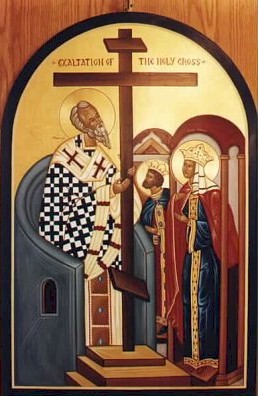The feast of the Exaltation of the Holy Cross had its roots in Emperor Constantine's vision of a cross before he set out into battle. This experience led to his conversion and the acceptance of Christianity by the Roman empire. A persecuted religion became the state religion and history shows what a mixed blessing that was!
 We Christians are used to the sight of the cross in our churches. We wear them around our necks; they hang from charm bracelets. Not surprisingly, the cross can easily become lost in the background - part of the architecture - just another piece of jewelry. We lose focus - so much so that we tend to take the cross for granted. But there is irony in this feast; we are praising and "exalting" a vicious instrument of execution.
We Christians are used to the sight of the cross in our churches. We wear them around our necks; they hang from charm bracelets. Not surprisingly, the cross can easily become lost in the background - part of the architecture - just another piece of jewelry. We lose focus - so much so that we tend to take the cross for granted. But there is irony in this feast; we are praising and "exalting" a vicious instrument of execution.
The Romans inherited the cross from the Persians, used it extensively, and became "masters of the craft." It was such a terrible form of execution that Roman citizens were not put to death on a cross. Crucifixion was used only on slaves and those who committed treason or brutal crimes. The victims were stripped naked, and their clothing given as a bonus to the soldiers. A placard, announcing only the person's name and crime, was carried by the criminal to the point of execution and then nailed over the head. Death was agonizingly slow, usually resulting from hunger and thirst.
St. Paul speaks often of the cross in his letters. He frequently reminds us that there is no work we can do that earns us redemption. Rather, through the cross, God has done the work of reaching out and uniting all people. Paul preached that God had nailed our sins and their resulting guilt to the cross; when Jesus died on the cross, so did our guilt. The mystery Paul preached is that it was the very instrument that put Jesus to death that was also the means of our new life. What we could not do, God did. Paul would conclude that we certainly have reason to exalt because the power of sin and death are conquered through the cross.
The Letter to the Philippians focuses our attention toward God's work on our behalf. And this work was a conscious decision and choice of Jesus. He wasn't coerced into this decision; he took it on freely and accepted the full consequents of his becoming human and being faithful to God - he accepted the cross. God enters human life and offers humans new life.
Today we are invited to reflect on the choices Jesus made and how God responded to them. Jesus not only accomplished a great work on our behalf, but now we are encouraged to act similarly - to act, as he did, for the good of others.
Paul was writing to a fractured Christian community; little has changed in our church. He is encouraging Christians to put aside what is ambitious, selfish and prideful. Forgiveness and service to one another go a long way towards healing the wounds in our church and world. The world that God entered was not a perfect place and no human work could make it so. But Christ has lived our life and has shown us how to be faithful to our calling as Christians in the world. His Spirit was let loose through his death and resurrection.
And each of us, baptized in his name, has received a share in that Spirit. This new life now breathing within us helps us to be faithful to the life Jesus has lived and died for us. This new life helps us to continue to proclaim: "God so loved the world that he gave his only Son, so that everyone who believes in him might not perish but might have eternal life."





